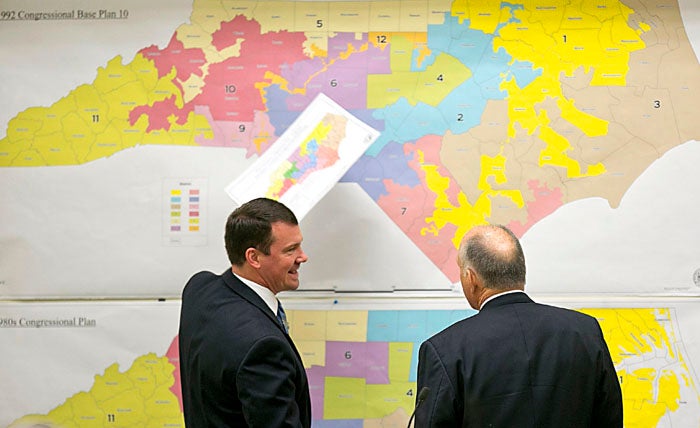NC congressional map challenged again on partisan bias
Published 6:42 pm Friday, September 27, 2019

- Republican state Sens. Dan Soucek, left, and Brent Jackson review historical maps during the Senate Redistricting Committee for the 2016 extra session in the Legislative Office Building in Raleigh. Corey Lowenstein/The News & Observer file photo via AP
By Gary D. Robertson
Associated Press
RALEIGH — Buoyed by a favorable ruling this month involving legislative districts, voters sued again Friday to overturn the state’s congressional map, alleging Republican state lawmakers manipulated lines to maximize GOP seats.
The registered Democrats and independents filed a lawsuit in Wake County Superior Court alleging extreme partisanship in how the 13 districts were drawn in 2016. They say the map violates the state constitution and want new districts for the 2020 elections. Republicans hold 10 of the seats in a state where statewide elections are usually closely divided.
“There is no dispute that the 2016 congressional map reflects an extreme and intentional effort to maximize Republican advantage,” the lawsuit reads. “Legislative defendants proudly admitted it at the time.”
The lawsuit, funded by a Democratic group, mimics successful arguments in partisan gerrymandering litigation in state court involving General Assembly districts. A three-judge panel ruled Sept. 3 that dozens of House and Senate districts had to be redrawn because their lines were designed to retain GOP majority control of the chambers.
A federal case on the congressional districts — alleging partisan gerrymandering that violated the U.S. Constitution — ended in June with the U.S. Supreme Court ruling in a 5-4 decision that it would stay out of such controversies. But the majority opinion, written by Chief Justice John Roberts, suggested states could intervene.
In the legislative district ruling — the first major partisan gerrymandering decision since the justices weighed in— state judges declared violations of state Constitution provisions demanding equal treatment of and free expression for citizens and elections free from interference.
The lines, the judges ruled, made it nearly impossible for Democrats to win majorities because they were skewed toward Republicans. Last week, the legislature approved alternative lines, which are now being scrutinized by the judges.
Should the congressional district challenge be successful, Democrats could be in position to win more seats in 2020 and make it harder for Republicans nationally to win back the U.S. House.
But getting new districts in place may be difficult, since candidate filing begins in December for a March primary. Courts and legislators previously have delayed elections when redistricting was required.
The strategy of using state courts to challenge partisan bias in congressional maps has been successful elsewhere.
The Pennsylvania Supreme Court last year struck down congressional districts based on a state constitution with wording similar to North Carolina’s, which says “all elections shall be free.” The Democratic-majority high court adopted new districts, under which Democrats gained four more seats in 2018 than they had won in 2016.
An arm of the National Democratic Redistricting Committee, led by former Attorney General Eric Holder, is bankrolling Friday’s lawsuit, as it did in the legislative case.
The litigation marks at least the ninth lawsuit challenging North Carolina maps since 2011. Political opponents of Republicans have gone repeatedly to the courts this decade to attempt to rein in right-leaning legislation and efforts to weaken Democratic Gov. Roy Cooper.
Republicans called Friday’s lawsuit another effort by Holder to use the courts — rather than voter persuasion at the ballot box — to remove the GOP from power in North Carolina and other states.
“Eric Holder’s ‘sue ’til blue’ endgame is a Democratic legislative majority created by Democratic judges,” Senate leader Phil Berger said in a statement.
Federal courts ordered North Carolina’s congressional map be redrawn in 2016 because of unjustified racial bias. During the 2016 redraw, GOP Rep. David Lewis, a chief mapmaker named as one of defendants, said during debate that he was proposing a map designed to give Republicans a 10-3 seat advantage “because I do not believe it’s possible to draw a map with 11 Republicans and two Democrats.”
Lewis said later he was joking, but the plaintiffs on Friday pointed out such language as proof the map “may be the most extreme and brazen partisan gerrymander in American history.”
“The facts of this case are undisputed, and the law of North Carolina is now settled,” the lawsuit reads.
Thomas Hofeller, a longtime Republican consultant and mapmaker who died last year, helped draw the congressional plan for Lewis and others, as he did with the 2017 legislative districts struck down this month. Hofeller’s records were subpoenaed from his daughter by Common Cause and Democrats who are plaintiffs in the legislative redistricting case.
Map critics contend voters supporting the minority party were packed tightly into fewer districts, resulting in easy victories, while the majority party wins narrower races, but in more districts. The 2018 election results bore this out, according to Friday’s lawsuit: the three incumbent Democrats won with at least 70 percent of the vote. But all Republicans last year in a contested race received 60 percent or less.




